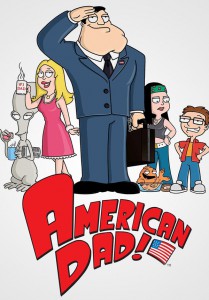TV Review: Atheists Can Relate to Latest Episode of American Dad!

Last Monday, TBS aired the first half (“Daesong Heavy Industries”) of a two-episode story of the adult animated sitcom American Dad! to which many humanists and atheists, especially those who were raised in a religious household, can relate.
Stan, the patriarch of the family, loses faith in Christianity after he finally reads the Bible for the first time—something that he does in response to his children Steve and Haley, who are bewildered while attending church that any adult could wholeheartedly swallow the sermons by the pastor.
To anyone who’s left religion, this is no surprise. There’s an aphorism (and accompanying Internet meme) that those who read the Bible become atheists, which is somewhat supported by the lack of Bible literacy in the US.
Stan decides life is no longer worth living since he no longer believes there is a God (a fear that some religiously devout do have, and the reason why organizations that counsel those who’ve recently left religion need to exist). Stan lies face down in his pool, and, as he nears death, he sees a vision of God and brightens in optimism before the god vision explains to him that what Stan’s seeing is merely his brain cells dying due to oxygen deprivation as he loses consciousness.
In order to raise Stan out of his sour spirits, Steve is tasked by his mother Francine to “fix” his father (since it’s Steve’s fault that his father lost his faith). Steve decides that the only solution is to help his dad believe in God again. He reasons that if he can prove to Stan that one story in the Bible is true, then his dad will (illogically) believe the rest of the Bible is true again. He discovers, via Google, Daesong Heavy Industries (a play on a similarly named company that merged with Samsung Heavy Industries in the 1980s) has a natural gas tanker holding many zoo animals that adequately convinces Stan to not only reclaim his Christianity but to believe that he is the next Noah.
It turns out that the company is accustomed to serving those who believe they are predestined to be the next Noah and even offers a built-in Noah’s Ark simulation for all the wannabes.
Stan discovers it was an elaborately constructed illusion and remains on the ship after the end of the simulation. A series of events leads the family to sail off on the ship, with all family members beginning to accept that Stan could be Noah when a heavy storm hits.
Part II (“Daesong Heavy Industries II: Return to Innocence”) starts on the ship with Stan rejoicing, “Thank you lord, you saved us—I’ll never question you again!”
Several moments later, in the midst of a dream about the storm, he wails, “Why me, lord? Why me? What good is faith when God treats you like this? Why me, lord? You speak every language, why are you talking to me in thunder?!”
But Part II does not embody the religion-centric tone of the first episode, and the family does not remain on the ship for long, instead splitting off into three separate stories of shipwreck when the natural gas ship explodes, with Roger the alien and Steve on a lifeboat, Haley and Jeff rescued by the Navy, and Stan and Francine rekindling their love—mockumentary style—on a deserted island.
By the end, the family reunites and resettles at home without attempting a hard answer about religion, returning the show to a more comfortable level of mildly offensive comedy and perhaps indicating that both believers and nonbelievers take the issue and the conversation too seriously. American Dad! pokes fun at this lack of a firm conclusion when Stan says, “We’re supposed to go back to our normal life?…What was all this for?…All this stuff happened and I don’t even know what it means?”
While it seemed like a cop-out ending, this unoffending and safe conclusion was probably to be expected, being a comedy-driven (and sometimes story-driven) adult cartoon, not a theological show (thankfully). At the least, it leaves room for future comedic clashes between theists and nontheists, and is a promising sign that once-considered profane critiques are more accepted.
